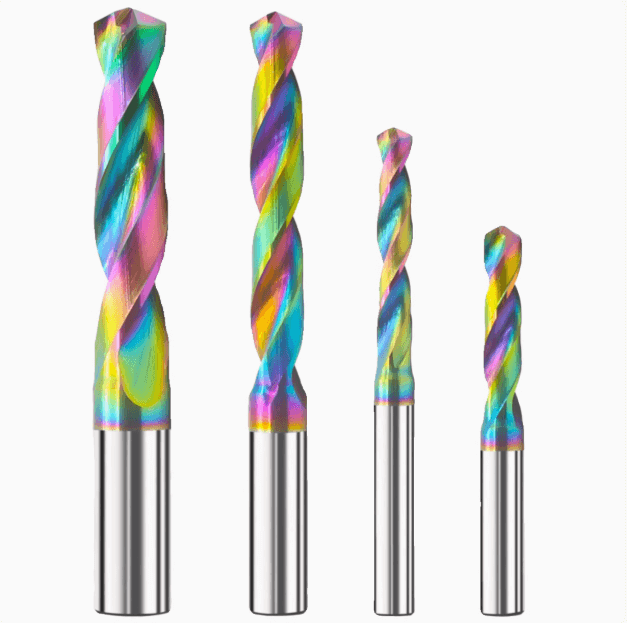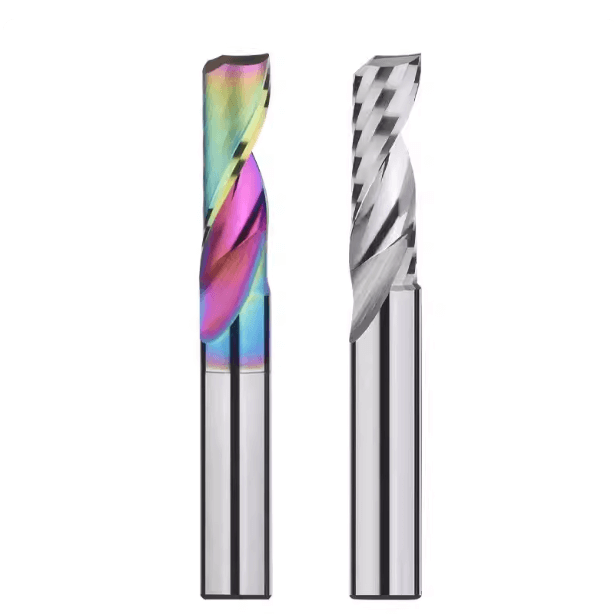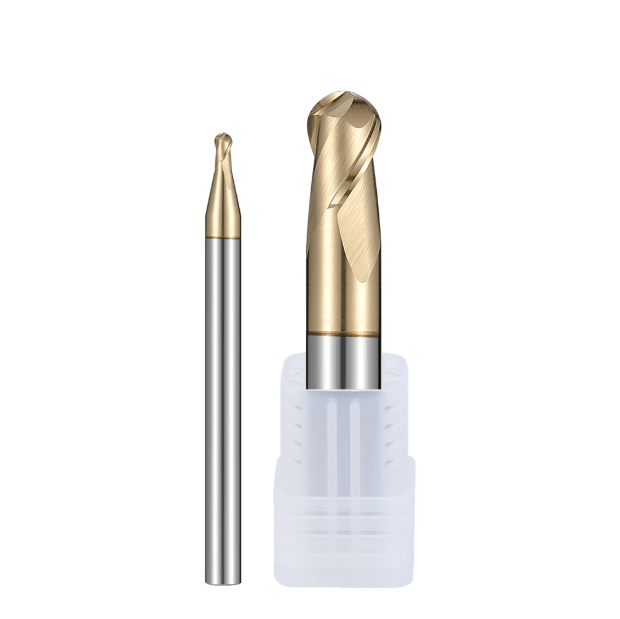In aluminum machining—from DIY enthusiasts using a handheld drill to make simple holes, to CNC engineers performing batch drilling on high-speed machines—choosing an excellent aluminum drill bit is crucial for ensuring quality and efficiency. Due to aluminum alloys’ characteristics—low hardness, high ductility, and tendency to stick to cutting edges—general-purpose drill bits often suffer from poor chip evacuation, rough hole walls, and even tool degradation during drilling.
Therefore, learning how to choose a specialized aluminum drill bit is a top concern for machines and fabricators in 2025. This article explores bit material selection, point geometry, and coating types, providing in-depth comparisons across brands and models. We’ll help you find a bit truly suited for CNC aluminum processing or pinpoint a highly efficient best bit for drilling aluminum. Based on real-world usage, we’ll recommend the best drill bit for aluminum for various applications—whether you’re a hobbyist or an industrial manufacturer, expect to receive professional, practical buying advice.
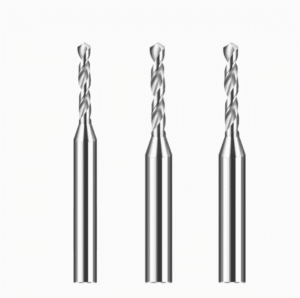
Why It’s Crucial to Choose a Dedicated Aluminum Drill Bit
Even though aluminum is softer than steel, its high ductility and tendency to adhere during drilling result in poor chip evacuation, increased tool wear, and compromised hole accuracy and surface finish. That’s precisely why a dedicated drill bit for aluminum is essential—it significantly enhances cutting smoothness, extends the tool’s lifespan, and delivers superior hole wall quality.
Cutting Characteristics of Aluminum
Aluminum alloys exhibit low hardness but high adhesion during machining. As drilling heat builds up, chips tend to weld to the cutting edge, forming built-up edge (BUE) that dulls the edge and degrades hole quality. Although aluminum’s thermal conductivity can be advantageous, improperly designed bits often result in overheating, chip clogging, and rough hole walls.
Hence, machining aluminum demands bits with excellent chip evacuation, low friction, and smooth surface finishes. In high-speed CNC setups and precision sectors like electronics or aerospace, using a purpose-designed drill bit for aluminum is especially critical.
Differences Between Aluminum Drill Bits and General-Purpose Bits
Aluminum drill bits stand apart from general-purpose ones through their optimized design:
-
Groove Geometry: Wider, deeper flutes facilitate chip evacuation and reduce clogging—a vital feature for sustained drilling performance.
-
Point Geometry: A 135° split point or sharper ensures faster penetration, accurate positioning, and reduced thrust force, enhancing efficiency.
-
Coating Options: Rather than typical TiN, premium aluminum bits often use non-stick coatings like ZrN, TiB₂, or come uncoated polished to minimize friction and heat build-up.
In short, if you want improved efficiency, extended tool life, and superior hole wall quality, a best bit for drilling aluminum is far superior to a generic drill.
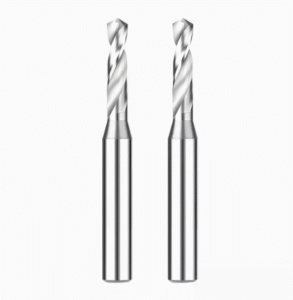
Comparison of Common Drill Bit Types for Aluminum
Choosing the best drill bit for aluminum involves understanding the strengths and applications of different materials. For applications ranging from thin-gauge sheets to high-speed, high-volume manufacturing, the main categories are HSS, cobalt alloy, carbide, and coated bits. These are compared below to help you select the right one for your needs.
HSS Drill Bits – Entry-Level Choice
HSS bits offer affordability and adaptability, making them a go-to for low-speed, light-duty drilling—perfect for handheld drills. They are reasonably sharp and work well on softer alloys like 6061. However, they lack the wear and heat resistance needed for sustained or high-speed tasks. For occasional DIY work or basic projects, an HSS aluminum drill bit offers excellent value.
Suitable users: Home hobbyists, small repairs, non-precision tasks.
Cobalt Alloy Drill Bits – Mid-Level Performance
Cobalt alloy bits (e.g., M35, M42), which are HSS enhanced with cobalt, deliver improved hardness and red/hot hardness resistance. They are ideal for medium-strength aluminum alloys like 7000-series or copper-containing alloys. These bits are commonly included in best drill bit for aluminum recommendations, offering a reliable balance of durability and cost—suitable for moderate production and precision requirements.
Suitable users: Small-to-medium businesses, maintenance shops, technically inclined users.
Carbide Drill Bits – High-Efficiency CNC Work
For those seeking high-speed, high-accuracy, and mass production—especially on CNC machines—carbide drill bits are the top choice. With exceptional hardness and heat resistance, they excel on aerospace-grade aluminum, die-cast pieces, and structural parts. Featuring finely ground edges and optimized flutes, these bits minimize chip buildup and maximize hole surface finish—earning recognition as the first choice for best bit for drilling aluminum in industrial settings.
Suitable users: Precision CNC shops, volume production manufacturers.
Coated Drill Bits – TiN vs. Non-Coated Polished Options
Despite aluminum’s low hardness, its high test-rig heat and stickiness means coating matters. Traditional TiN coatings can increase friction and worsen chip retention. Instead, standalone polished bits or ones with low-friction coatings like ZrN or TiB₂ deliver superior results on aluminum—especially in high-speed CNC environments where best bit for drilling aluminum performance hinges on chip control and thermal management.
Suitable users: Users needing high surface finish and performance consistency.
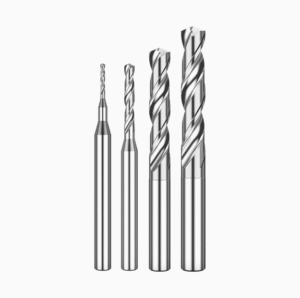
How to Choose the Most Suitable Aluminum Drill Bit
With a plethora of options available, finding the best bit for drilling aluminum tailored to your conditions comes down to four key factors: machinery, alloy type, geometry, and cooling strategy.
Choose According to Equipment: Hand Drill vs. Drill Press vs. CNC
-
Hand drills / portable tools: Opt for HSS or cobalt alloy bits offering versatility and toughness. Ideal for lightweight operations with handheld tools.
-
Drill press / bench devices: A 135° split-point bit improves alignment and stability—perfect for medium-batch, precise hole drilling.
-
CNC machining centers: Choose carbide bits with high-spiral flutes explicitly engineered for rapid, continuous machining of aluminum structural and electronic parts.
Match the Alloy: 6061 vs. 7075 vs. Die-Cast
-
6061 / 5052: Soft-to-mid hardness alloys can be efficiently drilled with coated cobalt or standard HSS bits.
-
7075 / 2024: These hard alloys call for carbide bits with high thermal tolerance in aerospace and automotive work.
-
Die-cast / recycled aluminum: Use sharp, deep-fluted bits with lubrication to navigate impurities and varied hardness zones.
Point Geometry & Flute Recommendations
Geometry is vital for performance and longevity:
-
135° Split Point: Enhances precision and prevents walking—widely regarded as one of the best bit for aluminum drilling designs.
-
Wide, high-spiral flutes: Reduce chip clogging and heat, especially crucial with sticky alloys.
-
Sharp, polished edges: Lower friction and boost hole quality—essential for high-speed drilling.
Dry Drilling vs. Lubrication – Cooling Tips
-
Dry drilling: Works for low-speed, brief tasks or environmentally sensitive settings—but risk of sticky chips and rough holes increases without proper bit choice.
-
MQL or cutting oil: Dramatically lowers friction, suppresses chip adhesion, and enhances longevity—highly recommended for CNC applications.
Choose an aluminum drill bit designed for either dry or lubricated setups based on your specific machine and process times.
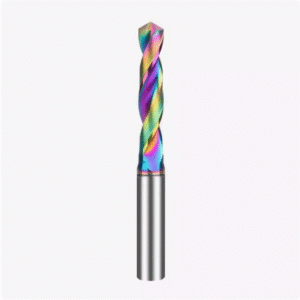
Recommended Brands and Models of Popular Aluminum Drill Bits in 2025
When it comes to drilling non-ferrous metals like aluminum alloys, choosing a purpose-built drill bit for aluminum is essential to improving hole quality, reducing chip adhesion, and extending tool life. Whether you’re a DIY hobbyist or a professional CNC machinist, there are numerous high-performance aluminum drill bit models on the 2025 market. This section highlights top-rated options by usage type, performance, and value to help you find the best drill bit for aluminum that suits your exact needs.Best Aluminum Drill Bits for DIY Users (e.g., Bosch, DEWALT)
For hobbyists and home users, ease of use and compatibility with hand drills are key factors. Affordable aluminum drill bits that perform well on thin aluminum sheets or tubing are highly recommended. Popular options in 2025 include:
-
Bosch aluminum bit series – designed for soft metals with polished flutes for better chip removal.
-
DEWALT multi-purpose drill sets – ideal for general light-duty projects, offering decent sharpness and durability.
These options are frequently rated as top picks on Amazon and Home Depot for “lightweight metal drilling efficiency” and “cost-effectiveness.” They’re perfect for furniture projects, DIY brackets, and aluminum tubing fabrication.
Top Picks for Industrial Users (e.g., Harvey Tool, Guhring, YG-1, SAMHO TOOL)
For industrial CNC environments, precision, stability, and long tool life are non-negotiable. Professional users drilling aluminum alloy grades like 6061 or 7075 should consider:
-
Harvey Tool – offers micro-diameter aluminum drills with tight tolerances, ideal for aerospace or automotive applications.
-
Guhring & YG-1 – optimized flute geometry and uncoated polished carbide drills perform exceptionally in high-speed machining.
-
SAMHO TOOL – known for cost-effective HRC55+ carbide drills with excellent chip evacuation, suitable for continuous production.
These industrial-grade aluminum drill bits often support 3×D to 5×D depth ratios, and many come with advanced features like split-point tips or high-helix angles.
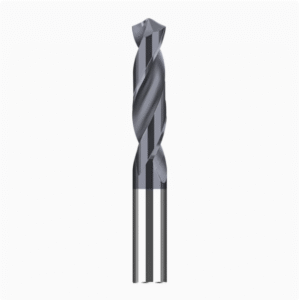
Choosing the Right Drill Bit Makes Aluminum Drilling Easier
Aluminum is lightweight, ductile, and machinable—but its softness and tendency to generate built-up edge (BUE) makes choosing the right drill bit for aluminum especially important. A properly selected drill bit will reduce downtime, enhance surface finish, and protect your tools.
-
DIY users should prioritize HSS or cobalt alloy bits for ease and value.
-
Precision-focused users can benefit from cobalt or polished carbide drills.
-
High-speed CNC environments require premium carbide bits with wide chip flutes and split-point geometry, especially for hard aluminum like 7075.
Don’t forget to also consider tool geometry: 135° split point tips, polished wide flutes, and proper lubrication (cutting oil vs. dry drilling) all play vital roles.
By 2025 standards, the best drill bits for aluminum will combine geometry, coating, and material science to achieve faster, cleaner, and more stable results across various projects.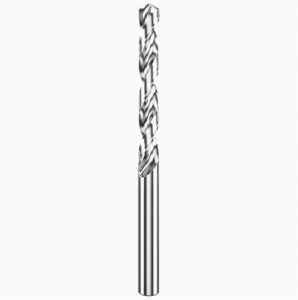
Aluminum Drill Bit Usage Questions
Can Regular Drill Bits Be Used for Aluminum?
Technically yes, but not recommended. Regular HSS bits may cause chip clogging, overheating, and poor surface finish. A dedicated aluminum drill bit ensures better performance due to optimized flute and tip geometry.
Why Do Drill Bits Tend to Clog or Stick When Drilling Aluminum?
Aluminum’s ductility leads to chip adhesion or BUE formation. This affects surface finish and increases tool wear. The solution? Use bits with polished surfaces, wide flutes, or coatings like ZrN that reduce friction and heat.
Can Aluminum Drill Bits Be Used on Other Non-Ferrous Metals?
Yes, they can work on soft non-ferrous metals like copper, magnesium, and brass, especially if these materials are similar in hardness and machinability to aluminum. However, harder or composite metals may require specialty bits for optimal results.



